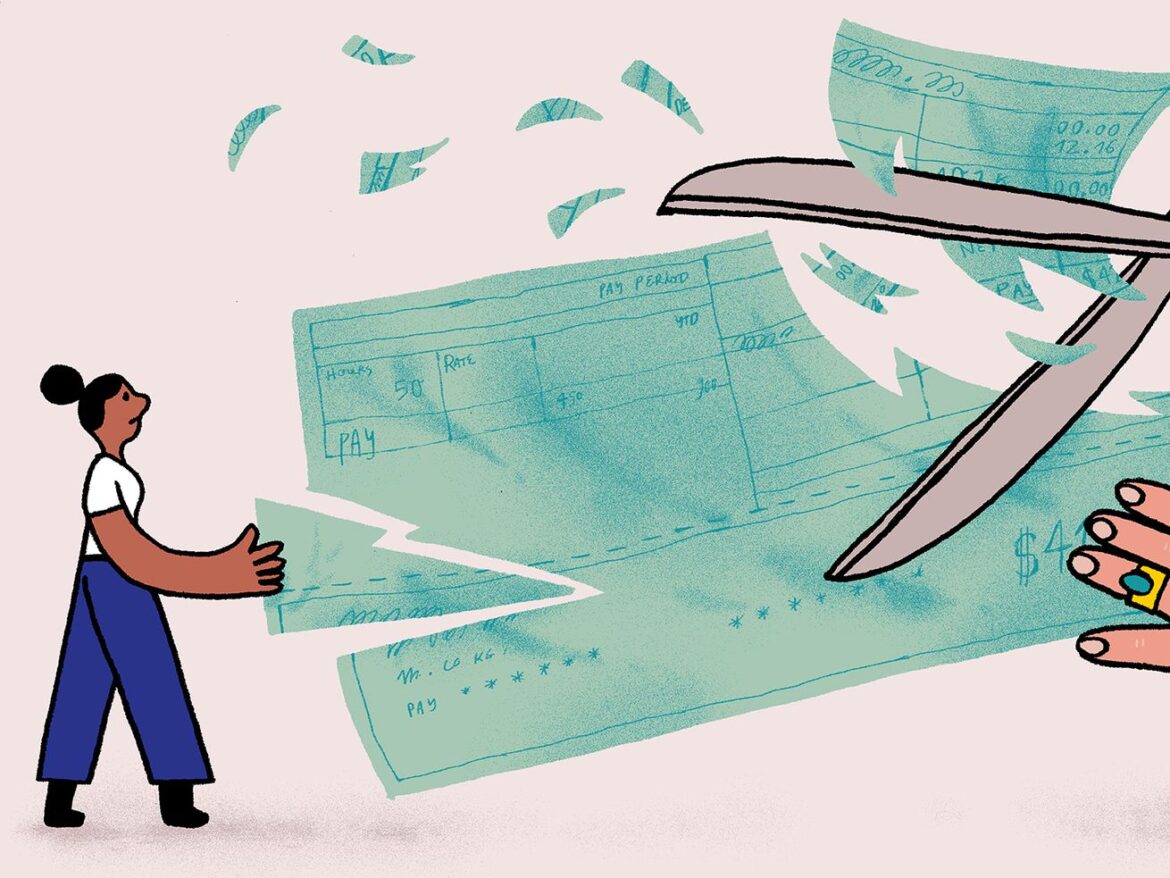Meet wage access apps — or payday loans by another name.
If you’re one of the more than a third of Americans who couldn’t afford to cover a $400 emergency, waiting a week or two or longer for a paycheck is a pain, especially if an emergency upends your already tight budget.
For some cash-strapped workers, the solution can be found in an earned wage access app — an increasingly popular service that offers users early pay, often in exchange for a fee, for work they’ve already completed but haven’t yet gotten a paycheck for.
Earned wage access has become an umbrella term for apps that pay out earned wages early, though there are key distinctions among different types of programs. Some of them are integrated directly into employers’ payroll systems to let employees get some of their wages in advance, leaving them with a smaller paycheck on their normal payday. These are offered by some of the biggest employers in the country, including Amazon and Walmart.
Direct-to-consumer early wage access programs, sometimes known as cash advance apps, on the other hand, function more like loans, giving workers their wages in advance based on what they report they’ll earn.
The market for both types of services appears to be growing rapidly. Workers accessed $9.5 billion via early wage access companies like EarnIn, MoneyLion, and DailyPay in 2020, up from $3.2 billion in 2018, according to a report from the research firm Aite Novarica.
The apps are popular across industries that employ low-wage workers, including food service, retail, and gig work, according to a 2021 report by the New York-based accounting and consulting firm KPMG. Employers such as Uber, McDonald’s, Burger King, Domino’s, and Chili’s have introduced earned wage access programs in some form, and KPMG predicts the sector will continue expanding and reach new classes of workers, including white-collar workers.
Early pay programs can spot workers who are short on cash, and some can be less costly compared to credit cards. But some apps charge service fees so high that many experts say they’re merely payday loans by another name, draining precious funds from already cash-strapped low-wage workers. Some programs’ fees are repaid by directly debiting workers’ bank accounts, which creates the risk of steep overdraft fees, said Lauren Saunders, associate director of the National Consumer Law Center.
Between January 2016 and January 2023, workers filed more than 450 payday loan-related complaints against early wage access providers with the Consumer Financial Protection Bureau, citing issues including unexpected fees, an inability to stop withdrawals from their bank accounts, and problems paying the advances off at the end of a loan period, Vox’s analysis of CFPB data found.
Employers position earned wage access programs as a workplace benefit and personal finance tool that offers workers flexibility and control over when they’re paid. Yet these services also reflect and reinforce the high cost of being poor in America: Rather than getting paid enough in the first place to cover everyday expenses and save for emergencies, workers are penalized for needing early access to wages that they’ve already earned.
“The biggest problem with these programs is they really end up [with] people paying to be paid, and that’s just wrong,” Saunders said.
With their popularity surging, early wage providers are now facing intensifying regulatory scrutiny, which could limit their ability to extract high fees from their customers. But the industry is also working to head off regulation by carving itself out of laws that protect consumers from predatory lending.
Early wage access, explained
Some companies cover their workers’ fees for early wage programs, so they can get their pay earlier at no extra charge, while others pass the costs onto employees and contractors. Employer-based programs generally charge fees of a few dollars per transaction, depending on the amount of money that’s requested, while cash advance app fees can range from less than a dollar to over $20, according to Nerdwallet.
That may not sound like much, but the costs can add up. Uber, for example, offers an early wage access service that lets drivers cash out their earnings up to five times per day for $0.85 per transaction. If a driver does this every day for five days, it’ll cost them $21.25 in fees. Multiply that over four weeks, and it totals $85. A recent report from California’s Department of Financial Protection and Innovation found that fees for early wage access programs, including both employer-backed and direct-to-consumer programs, averaged an eye-popping annual interest (APR) of more than 300 percent.
“Employers often claim that these programs are a benefit. If they’re a benefit, then the employer should pay for it,” Saunders said.
Some cash advance apps push customers to pay a “tip” to the app to be able to access their funds. The term “tip” is effectively a way for apps to disguise fees, said Yasmin Farahi, deputy director of state policy and senior policy council at the Center for Responsible Lending. Consumers often don’t know that these fees are optional and cannot figure out how to opt out of them, she added.
Employer-backed early wage services don’t ask for tips, but they may begin to if regulators allow it in the future, Andrew Kushner, policy counsel at the Center for Responsible Lending, told Vox.
The fees can push low-wage workers into a vicious cycle of reborrowing. “Any time there’s a fee involved in that — even a small one — that’s going to add up. And at the end of the day, all you’ve done is added more fees to your budget rather than have any greater ability to handle expenses,” Saunders said. “For low-wage workers, even a few dollars are a meal.”
In theory, early wage access programs are best used as a one-off, to cover an unexpected expense or budget shortfall. But once workers start using it, they tend to start needing it for every paycheck, trapping them in a cycle of needing a cash advance every pay period, Farahi said.
Some research suggests that wage access users repeatedly turn to these services after they’re introduced. A March 2022 paper by Harvard and Yale researchers, examining data from the Mexican fintech firm Minu, found that 40 percent of workers who began using early wage access continued to use it afterward.
Another June 2023 survey from Harvard researchers found that only a quarter of respondents used direct-to-consumer early wage access apps to cover emergencies or unexpected expenses, while three-quarters rely on such services to pay for regular expenses like groceries, rent, gas, and childcare.
Of the survey respondents who used early wage access apps in the past year, a third said they used them a few times a year, while 21 percent said they used them once a month and 16 percent used them twice a month or twice a week.
“Because people are likely to have to keep taking these out, then what sounds like a really short-term loan can end up being a longer-term loan, [a] longer-term cycle. And that’s where we see the similarities of payday loans,” Farahi said.
Regulators are eyeing the earned wage industry
Because early wage access apps are so new, financial regulators haven’t settled on how to classify and govern them. Many states have lending laws, such as interest rate limits or disclosure regulations, that may apply to wage access services if they’re legally considered loans. “Lending laws have a lot of important protections to protect people against problems that credit can create,” Saunders said.
In 2019, the New York State Department of Financial Services (DFS), along with financial regulators from 10 other states and Puerto Rico, launched a multi-state probe into the payroll advance industry to investigate allegations that it was collecting illegally high interest and fees, as well as improperly triggering overdraft fees on users’ bank accounts. When asked about the status of the inquiry, a spokesperson for DFS said it cannot comment on ongoing investigations.
In Pennsylvania, the company Activehours, Inc., better known as the early wage access app EarnIn, is facing a lawsuit alleging that its interest rates, fees, and other charges exceed the state’s maximum interest rate of 6 percent. The suit also alleges that customers can’t figure out how to opt out of tipping the company for its services. Activehours did not respond to Vox’s request for comment.
Meanwhile, the earned wage access industry is trying to head off regulatory scrutiny. Last year, the American Legislative Exchange Council (ALEC), a prominent conservative lawmaking group that writes draft legislation for state governments, created the “Earned Wage Access Act,” a proposed law intended to soften regulation of the wage access industry. It would exclude early wage access services from the definition of credit and prevent them from requiring credit scores or reporting customers’ payment history to credit bureaus, essentially exempting them from lending laws that protect consumers.
ALEC didn’t respond to Vox’s request for comment about which states it’s trying to push the bill in, but Missouri and Nevada have passed legislation modeled on the bill, and a handful of mostly red states are considering similar laws, Bloomberg Law reported last month.
For the early wage industry, it’s critical to avoid being defined as credit because that would make it subject to state and federal credit regulations, such as caps on fees or interest rates, Saunders said. The ALEC bill would create “a gigantic loophole” in state lending laws, she said, enabling a new form of payday loan available at the click of a button that comes with predatory annual interest rates of 150 percent to 500 percent.
Connecticut has passed legislation defining early wage services as loans, and California is working on rules that would do the same, Bloomberg Law reported.
The Consumer Financial Protection Bureau has begun taking enforcement actions in the early wage space. Last year, the agency rescinded a provisional approval order that had safeguarded the early wage provider Payactiv, which partners with employers, from liability under the Truth in Lending Act, a federal law that protects consumers from unfair credit practices. A CFPB spokesperson did not say whether the agency would take more enforcement actions in this area, but told Vox it intends to clarify what is considered credit under current laws.
Just pay people enough to live
The early wage access industry has emerged because so many Americans aren’t paid enough, and they aren’t paid quickly enough. There’s frequently a lag of several days between when employees complete their work and when they get paid, making many workers reach for early pay apps.
The US still largely lacks the ability to make instant, real-time payments between bank accounts — a technology that’s widely available in many other countries — which means it can take longer for workers to get paid. Slow bank payments “have very significant wealth effects for low-wage workers,” said Elena Botella, author of Delinquent: Inside America’s Debt Machine. Fintech companies have stepped in to fill that void with early wage apps, offering workers faster access to their earnings for steep fees.
The Federal Reserve launched its own US instant payments system, called FedNow on July 20, which could speed up the delivery of paychecks to workers.
Though a faster payment system would benefit workers, the financial services sector has benefited somewhat from America’s slow payments system through bank overdraft fees and check-cashing services. Banks with more than $1 billion in assets generated $1.4 billion in overdraft-related fees in Q1 2023, according to an S&P Global Market Intelligence Report released in May.
Banks can also ease the burden on low-income people by not clearing low-wage workers’ paychecks at a slower pace than higher earners, said Botella, who formerly worked at Capital One and now is principal at Omidyar Network. If a customer has overdrawn their account in the past, some banks will delay how soon they can access the funds as part of their fraud mitigation efforts — but this ultimately can push low-income workers toward alternatives, like wage access apps, that will get them paid faster, Botella added.
The more obvious, more permanent solution is to pay workers a living wage, Saunders said. Early wage access shouldn’t be viewed as an “escape hatch” that makes it easier for employers to pay subpar wages. “Employers have a moral imperative to pay their workers a living wage to enable the essential workers that support us all to live on what they’re being paid,” she said. “Giving people the opportunity to borrow from next week’s paycheck because this week is not enough — it’s not a substitute for a living wage.”
The reporting for this story was supported by the Economic Hardship Reporting Project.



